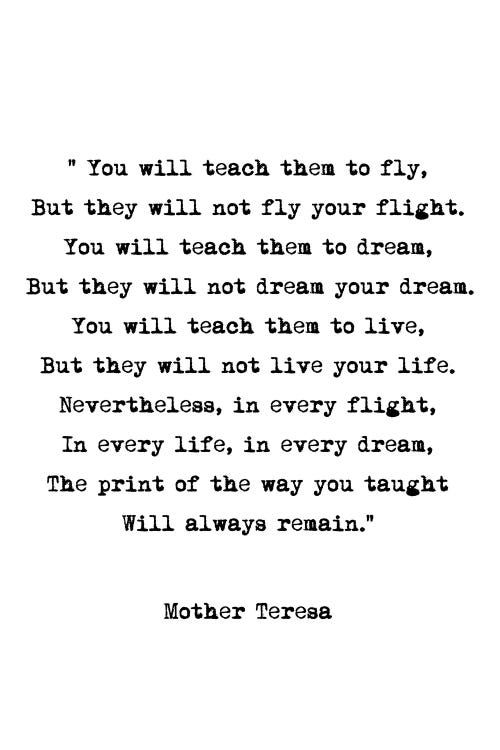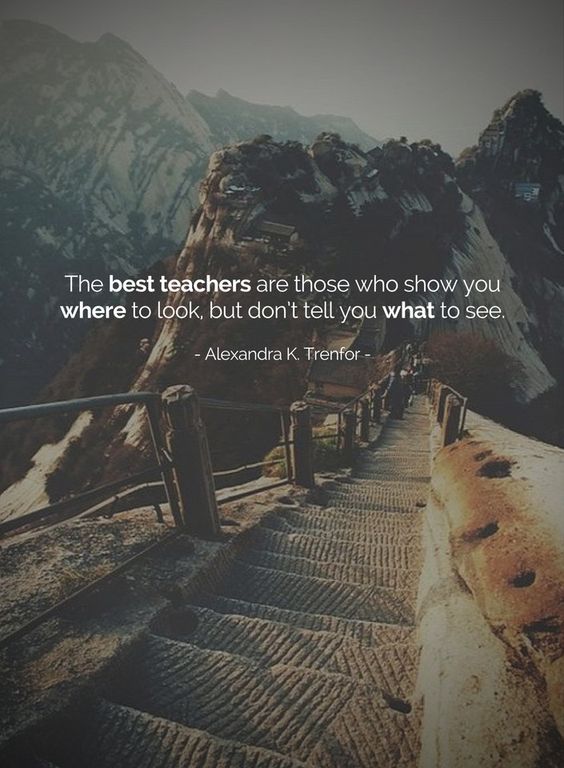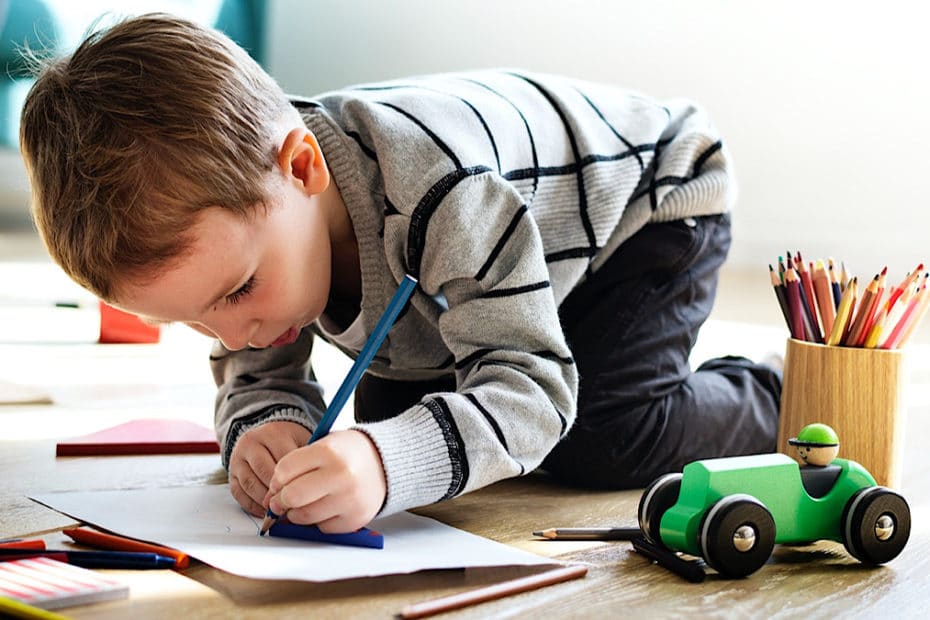“The job of the teacher is to create the conditions for the student to explore their incompetence long enough to learn something useful.”
Seth Godin | Read Matt’s Blog on this quote ➜
“My job as a teacher was to help them breathe with excellence and discipline in the classroom. The ones that love you, they become what you model. Don’t forget that. Help them breathe by modeling responsible love in the classroom every single day. The most important thing a teacher can do is give their students permission to be loving and excellent.”
Kiese Laymon’s mom, Heavy (Page 180)
“The rest of my teachers maybe did the best they could, but they just needed a lot of help making their best better. There were so many things we needed in those classrooms, in our city, in our state, in our country that our teachers could have provided if they would have gone home and really done their homework. They never once said the words: ‘economic inequality,’ ‘housing discrimination,’ ‘sexual violence,’ ‘mass incarceration,’ ‘homophobia,’ ’empire,’ ‘mass eviction,’ ‘post traumatic stress disorder,’ ‘white supremacy,’ ‘patriarchy,’ ‘neo-confederacy,’ ‘mental health,’ or ‘parental abuse,’ yet every student and teacher at that school lived in a world shaped by those words.”
Kiese Laymon, Heavy (Page 114)
“When we raise our expectations for a student, a friend or a co-worker, we open the door to possibility. We offer them dignity and a chance to grow. We are offering them trust. But if we become attached to those expectations, if the expectation unmet leads us to distress or unhappiness, then that attachment undermines the very reason we created the expectation in the first place.”
Seth Godin
“It is standard practice in many schools to punish children for tantrums, spacing out, or aggressive outbursts—all of which are often symptoms of traumatic stress. When that happens, the school, instead of offering a safe haven, becomes yet another traumatic trigger. Angry confrontations and punishment can at best temporarily halt unacceptable behaviors, but since the underlying alarm system and stress hormones are not laid to rest, they are certain to erupt again at the next provocation.”
Bessel van der Kolk, The Body Keeps The Score (Page 355) | ★ Featured on this book list.
“More than anything else, being able to feel safe with other people defines mental health; safe connections are fundamental to meaningful and satisfying lives. The critical challenge in a classroom setting is to foster reciprocity: truly hearing and being heard; really seeing and being seen by other people. We try to teach everyone in a school community—office staff, principals, bus drivers, teachers, and cafeteria workers—to recognize and understand the effects of trauma on children and to focus on the importance of fostering safety, predictability, and being known and seen. We make certain that the children are greeted by name every morning and that teachers make face-to-face contact with each and every one of them. Just as in our workshops, group work, and theater programs, we always start the day with check-ins: taking the time to share what’s on everybody’s mind.”
Bessel van der Kolk, The Body Keeps The Score (Page 354) | ★ Featured on this book list.
“There are many people who claim to be teachers of others who should themselves be taught first of all.”
Eastern Wisdom, via A Calendar of Wisdom (Page 326)
“Teachers who expect greater things from their pupils can, without ever saying anything, have a positive effect on their work and grades. By feeling particularly excited when you’re meeting someone, you will communicate this to him or her in a powerful way.”
Robert Greene, The Daily Laws (Page 301)
“Remember, I am no teacher; I can merely be a signpost for a traveler who is lost. It is up to you to decide on the direction. All I can offer is an experience but never a conclusion, so even what I have said needs to be thoroughly examined by you. I might be able to help you discover and examine your problem by awakening your awareness of their cause and effect, but I cannot teach you, for I am not a teacher, and I have no style. I don’t believe in a system, nor in a method. And without system, without method, what’s to teach?”
Bruce Lee, Striking Thoughts (Page 90)
“A teacher, a good teacher that is, functions as a pointer to truth, but not a giver of truth. He employs a minimum of form to lead his student to the formless. Furthermore, he points out the importance of being able to enter a mold without being imprisoned by it, or to follow the principles without being bound by them.”
Bruce Lee, Striking Thoughts (Page 90)
“I seek neither your approval nor to influence you. So do not make up your mind as to ‘this is this’ or ‘that is that.’ I will be more than satisfied if you begin to learn to investigate everything yourself from now on.”
Bruce Lee, Striking Thoughts (Page 2)
“A teacher is never a giver of truth; he is a guide, a pointer to the truth that each student must find for himself. A good teacher is merely a catalyst.”
Bruce Lee, Striking Thoughts (Page xvi)
“everyone is a teacher, but that does not mean everyone is correct.”
Yung Pueblo, Inward (Page 183)
30 Quotes Celebrating Teachers—The Caretakers Of Our Future
Excerpt: This list of 30 Quotes for Teachers is about uplifting (and celebrating) those remarkable individuals who have shaped (and will continue to shape) our world—present and future. Enjoy!
Read More »30 Quotes Celebrating Teachers—The Caretakers Of Our Future
W. B. Yeats Quote on Looking At Education Like Lighting A Fire (Not Filling A Bucket)
“Education is not the filling of a bucket, but the lighting of a fire.”
W. B. Yeats
Beyond the Quote (26/365)
The mind does not have confines like the walls of a bucket nor does it have a maximum limit like that of a bucket—it is unbounded and is of unlimited potential. The mind needs to be thought of like a fire. Not only is a fire wall-less, topless, and without a maximum limit, but it has an insatiable appetite that will continue consuming for as long as you continue to feed it—like that of the mind. This is an important distinction because when we change the way we view our minds, we change the way we treat our minds (and the minds of those we’re treating).
Read More »W. B. Yeats Quote on Looking At Education Like Lighting A Fire (Not Filling A Bucket)The Little Boy by Helen Buckley — A Short Story About Cultivating Imagination and Creativity in Children
Excerpt: The Little Boy by Helen Buckley is a powerful short story about cultivating imagination and creativity in children. A must-read for teachers.
Read More »The Little Boy by Helen Buckley — A Short Story About Cultivating Imagination and Creativity in Children




